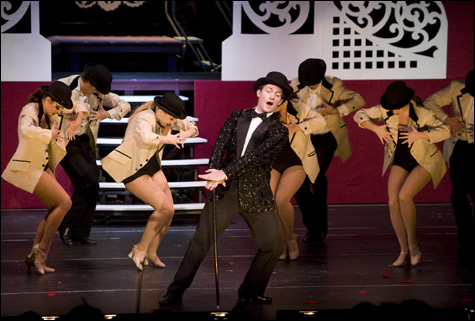
FOLLIES: Sondheim, it seems, doesn’t approve of student productions of this work — too bad he didn’t see this one. |
The biggest musical celebrity in town last week was Broadway great Stephen Sondheim, who filled Northeastern University’s Blackman Hall “in conversation” with his long-time associate, producer/composer Sean Patrick Flahaven. For 90 minutes they covered the more than half-century span of Sondheim’s career (he’s now 78), from the early Saturday Night through the forthcoming revival/revision Road Show. “I like writing about obsession,” Sondheim said. “It lends itself to passion.” Flahaven asked why so many of his musicals were about marriage even though the composer has never been married. Sondheim said that the qualities Shaw recommended for a playwright were experience, observation, and imagination, but that you could still get by with only two of these. When he was working on Company, he said he interviewed his friend Mary Rodgers (Richard Rodgers’s daughter), who had recently remarried. “This may sound crass,” he admitted, “but I took notes.” When he was finally in a relationship, this most private of artists added, he could then write about this subject from the inside.
He praised Du Bose Heyward’s lyrics to Porgy and Bess’s “Summertime.” “I would have written ‘Summertime, when the livin’ is easy.’ It takes a genius to write ‘Summertime, and the livin’ is easy.’ ” Asked about the scarcity of rhyme in his 1994 musical Passion, he said that rhyme “bespeaks control — a certain amount of reserve, of intellect” that wouldn’t be appropriate for these romantic characters. Responding to the accusation that he writes tunes you can’t leave the theater humming, he said, “If you hear any music enough times, you can hum it. I can hum the Berg Violin Concerto.” Why hadn’t he written much since Passion? “The older I get, the more frightened I get of writing. A new subject has to scare you because you’ve never done it before.” About his use of irony: “I’m a traditionalist — I believe in content dictating style.” Asked by a young composer in the audience whether he regarded his music as a profession or a calling, he said, “It’s a privilege to write music. It’s more than a profession — it’s a pleasure.” He was hoping, he said, to write another “large romantic piece like Sweeney Todd — something pretentious.”

On a TV documentary, Sondheim once introduced a “medley of my greatest hits: ‘Send In the Clowns.’ ” At Northeastern, the conversation was punctuated by pianist Charlie Alterman accompanying the radiant Kate Baldwin (she was the touching heroine of the Huntington’s She Loves Me) in a revelatory series of less familiar Sondheim songs that included the exquisite “I Remember Snow” (from his TV musical, the creepy Evening Primrose), “The Miller’s Son (a self-knowing celebration of sexuality and fantasy, from A Little Night Music), “Another Hundred People” (an ironic paean to New York, from Company), and the heartbreaking “Loving You,” from Passion.
This has been a good period for Boston’s Sondheim fans. This fall, there’ve been two terrific productions of Follies, perhaps his most ambitious show (in which “real life” becomes transformed into a series of production numbers): one at Lyric Stage, with a cast of Boston favorites, and one at Boston Conservatory, with a stageful of its staggeringly gifted students, the latest incarnation of its love affair with Sondheim, and director Neil Donohoe heading the brilliant production team. Sondheim, I gather, doesn’t approve of student productions of this show, which is so much about the immaturity of maturity. Too bad he didn’t see Lauren Lukacek, as the naive, self-deluded Sally, and Hannah Jane McMurray (the next Donna Murphy?), as the painfully all-too-knowing Phyllis — very adult performances by actresses who can also sing and (especially McMurray) dance. This was, as always, a team effort, and the curtain call consisted of individual bows for each member of the huge, deserving cast.
An appallingly overamplified sound system distorted both speaking and singing voices to the point of incomprehensibility. Some amplification may be necessary because the theater has no orchestra pit. But opening night, when one performer’s body mic gave out, he could actually be heard more distinctly and appealingly. The school has started a fund drive for a new theater complex (with an orchestra pit!); the best theater department in town deserves a more up-to-date venue.
Boston Conservatory’s String Masters Series presented the estimable Jorja Fleezanus — who’s about to retire from the Minnesota Symphony, where she’s been concertmaster for the last 20 years — in a delicious chamber recital with her frequent partner, master accompanist Karl Paulnack. Spirited and sensitive playing were the order of the evening in a varied program that began with Bach’s E-major Sonata (Fleezanus called it “a honey of a piece”) but centered on two 20th-century pieces, Yehudi Wyner’s rich, rhapsodic, ferocious, jazzy, no-holds-barred Concert Duo (50 years old, but not a bar has dated) and George Perle’s antic, nose-thumbing neo-classical Triptych.